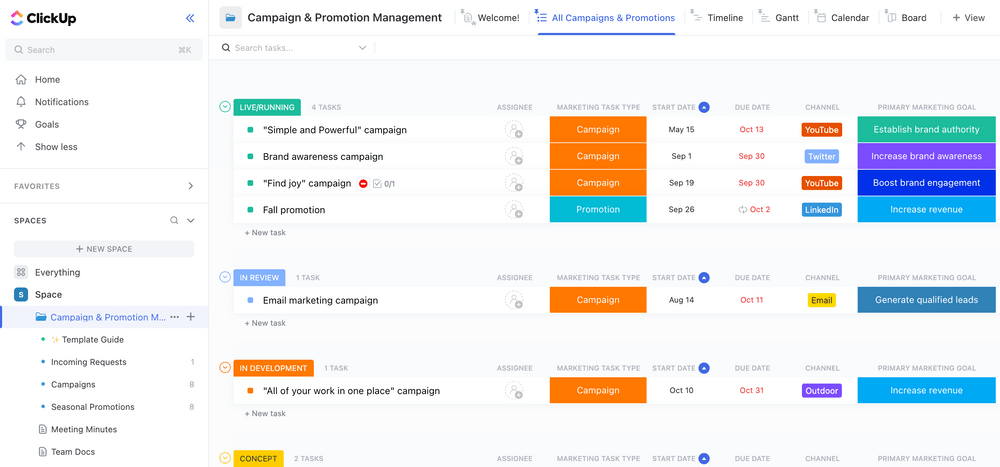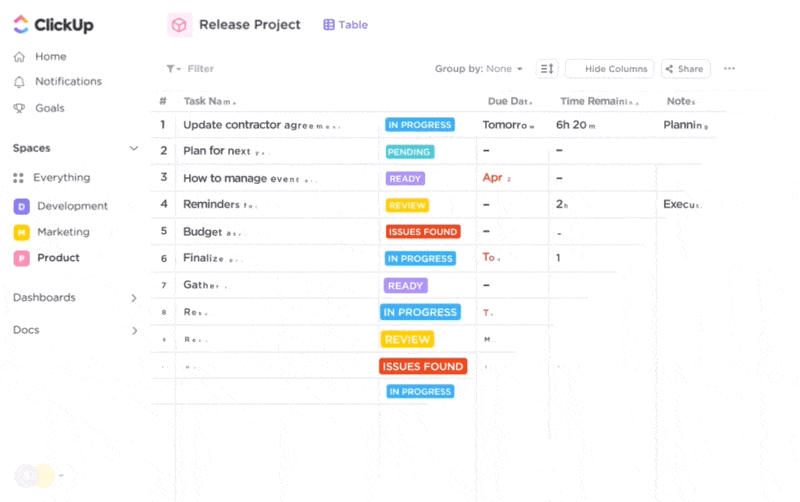Effective Promotion Strategies: Drive Sales and Boost Brand Awareness

Sorry, there were no results found for “”
Sorry, there were no results found for “”
Sorry, there were no results found for “”

Effective promotion strategies can drive sales, increase brand awareness, and engage your target audience. 🌻
Whether you’re a small business owner or a marketing professional, understanding how to create and implement these strategies is essential. It’s all about clearly defining your goals and identifying the path to success.
This guide has everything you need to know about promotion strategies, including what they entail, how to use them, and what results to expect. We’ve also highlighted some examples to inspire your next great marketing campaign.
A promotion strategy is a type of marketing designed to increase the visibility, desirability, and sales of a product, service, or brand. It involves marketing tactics designed to reach and connect with a target audience, including new and existing customers.
Information about the target audience lets you craft marketing goals and tactics likely to drive conversions. It also helps you choose the correct types of promotional campaigns, which might include:
You don’t need to use all of these tactics. Most companies and marketing professionals select the ones that are most appealing to their target market.
The promotion strategies you choose to use are known as your marketing mix.
Each element of your marketing mix will require its own strategy. For example, content marketing efforts can benefit from a well-thought-out content calendar, an SEO plan, and high-quality call-to-actions (CTAs).
The purpose of a promotion strategy is to improve brand visibility, drive sales, and attract new customers by communicating your product or service’s value proposition to the target audience.
Before you implement one, you’ll want to define elements like:
Seasoned professionals will likely know this as defining your marketing OKRs. You’ll use your OKRs (which is short for objectives and key results) to track and measure the success of products, services, and related strategies. 📈 🙌
While specifics often vary between companies, almost all promotion strategies aim to create awareness, generate interest, and foster customer loyalty and satisfaction.
Your company’s primary goals might include growing your customer base, turning new customers into loyal customers, engaging existing customers by building trust, or all of the above.
Once your promotional effort is underway, marketing campaign management strategies help you track the key results and adjust as needed.
Understanding the general idea of a promotion strategy is a start. Now, it’s time to look at how to develop and execute your big plan!
Let’s take a step-by-step look at the most important elements below.
Researching and developing a better understanding of your target audience is essential when creating any new brand management strategy. Once you know who you’re targeting, it’s time to establish a deeper understanding of how to engage them.
The best way to get inside the minds of your target audience is market segmentation. In other words, you’ll break down your target audience based on things like:
This information can help you develop effective new product launch strategies, identify the best marketing channels, refine your landing pages, connect with current customers, and drive the overall success of your brand.
Pro tip: Some digital marketing apps can help you segment your target audience with templates and questionnaires.
Studying how people within your target demographic interact with various types of content is an essential element of deciding how to spend your marketing budget.
Methods of content consumption might include:
Tools like Google Analytics, social media analytics, email marketing platforms, and market research surveys can help you effectively gather data on your audience’s content consumption habits.
The best tool depends on your business. For example, a startup with a limited customer base might not benefit from sending a market research survey to existing subscribers as much as an established company would.

Pro tip: Customer profile templates can lay the groundwork for your marketing team to better understand how your customers prefer to consume content.
Learning more about how your target audience consumes content helps you refine marketing initiatives by selecting the best channels for your promotion strategies.
For instance, you don’t want to pour everything into email campaigns when your audience responds better to social media marketing. In this case, allocating part of your budget to TikTok marketing tools might be more effective at increasing sales and brand loyalty.

Pro tip: ClickUp’s Data Analysis Report Template can make finding patterns and trends in the data easier. It has everything you need to identify which types of content and marketing channels perform best at driving customer engagement. 👀
Now that you’ve selected the optimal channels for promotion, it’s time to determine the costs of each and develop a budget for your promotion strategy.
You might not be able to budget for every marketing channel you selected in the above step. Sometimes, it’s about balancing cost-effective strategies and those that create the greatest sense of urgency for your audience.

Pro tip: ClickUp’s Marketing Budget Template can help you outline your campaign initiatives, the goals they’re aligned with, and whether you’re staying on budget each quarter. It’s also a fantastic way to compare how different marketing efforts perform over time.
Evaluating your promotion strategies’ strengths, weaknesses, opportunities, and threats (SWOT) is essential to create effective campaigns. Here’s a breakdown:
By examining these factors, you can better understand how to leverage your strengths, address weaknesses, take advantage of opportunities, and mitigate threats to create more effective promotions.

Pro tip: Check out some free SWOT analysis templates to make it easier to understand core issues that impact your success.
Now for the fun part! Developing and implementing your marketing plan. ✨🎉
It’s time to send free products to influencers, launch email campaigns, run paid ads on Amazon, or otherwise execute the steps you’ve chosen to improve your brand image and customer retention.
This step entails creating a detailed roadmap of your marketing objectives, strategies, tactics, and milestones. Your roadmap is your guide for executing your plans and making necessary adjustments to keep things on track.
Pro tip: ClickUp has dozens of marketing plan templates to guide you through this process—helping you develop and optimize every facet of your brand promotion strategy.
We listed several types of promotion strategies earlier in the article. Let’s take a closer look at five of the most popular options.
Influencer marketing involves partnering with or offering sponsorships to individuals with a solid following and influence over your target audience. Influencers can promote your brand’s products or services via sponsored posts on platforms like Instagram, YouTube, and TikTok.
Direct marketing is all about reaching out to potential customers using channels like email, direct mail, telemarketing, and SMS. Examples include email newsletters, catalogs, flyers, and targeted online advertisements.
For instance, an e-commerce company might text potential customers offering limited-time deals for relevant, high-quality products.
📮ClickUp Insight: 83% of knowledge workers rely primarily on email and chat for team communication. However, nearly 60% of their workday is lost switching between these tools and searching for information. With an everything app for work like ClickUp, your project management, messaging, emails, and chats all converge in one place! It’s time to centralize and energize!
Public relations is all about managing relationships with the public, media, and other stakeholders to build a positive brand image, increase customer engagement, and improve retention. This might include press releases for new products, media interviews, sponsorships, and community outreach events.
Sales promotions involve short-term incentives designed to encourage immediate purchase or action. This approach often includes discounts, coupons, BOGO (buy one, get one) offers, limited-time sales, contests, and giveaways.
It’s often combined with strategies like direct marketing or influencer sponsorships.
Advertising is the bread and butter of many brands’ marketing. The most popular types of advertising outlets include paid social media posts, search engine results, and online display ads.
Creating a successful promotion strategy doesn’t happen overnight, and it’s easiest when you’re leveraging effective tools that save you time and money. 🛠️
ClickUp for marketing teams is the most effective tool for managing and optimizing every aspect of your marketing efforts.
It has everything you need to handle projects, tasks, and campaigns for your marketing and promotional projects.

For instance, use the free ClickUp Campaign and Promotion Management Template to get started in seconds. It was designed with advanced features to simplify complex needs and a ready-to-use, fully customizable Folder to make campaign management a snap.

You can also use different ClickUp views to monitor and analyze your strategy from all sides. Swap between views for every event, database, content calendar, and campaign so you can see what you need when you need it.
The best part? Most of ClickUp’s features are free to use.
We don’t mean that it has a free trial—we mean that you can sign up for the Free Forever plan without a credit card and start using the tools right away.
Examining promotion strategy examples from other businesses is one of the best ways to identify ways to improve yours. It’s even better if you can learn from a company that runs several successful campaigns to see what tools they’re using and how they do it.
Adhere Creative is an excellent example. Adhere is an award-winning B2B brand development and video content agency that relies on ClickUp for all things project management.
“I use ClickUp to manage every aspect of our agency’s production, from strategy, copy, and design to development, printing, and launch. Without ClickUp, we would be lost,” says Ericka Marett, the sole Project Manager at Adhere Creative.
Ericka uses ClickUp for everything from managing daily tasks to developing project estimates, timelines, and documents. With features like ClickUp’s Board view and individual to-do windows, she’s able to keep everyone on the same page for client marketing campaigns, promotions, and more.
Adhere Creative doesn’t have just one example of how ClickUp has helped—Erika uses it to manage marketing campaigns successfully for dozens of clients. 🤩
Anyone running a business or handling promotion strategies in today’s marketing landscape knows things are changing. There’s a shift toward social media platforms like TikTok, Instagram, and LinkedIn.
These platforms have become essential for building brand awareness, fostering customer relationships, and driving sales.
This paradigm shift has revolutionized marketing, creating new ways to engage with diverse audiences through targeted video content.
You can use strategies like the following to improve your success rate in the increasingly digital marketing landscape:
There are numerous promotional strategies to try, but five of the best include:
Promotion strategies are important because they allow you to communicate your business’s value proposition, attract customers, drive sales, and increase brand awareness in today’s competitive market.
Creating a promotional strategy involves steps including:
A solid promotion strategy is essential to increase visibility, attract new customers, and drive sales. It enables targeted communication, fosters customer engagement, and helps secure a competitive edge. 🏆⭐
Unlock the power of organization and efficiency by leveraging ClickUp, the ultimate solution for optimizing all facets of your marketing projects.
From planning and execution to data analysis, our suite of customizable features will elevate your work from all directions.
See for yourself without spending a dime—sign up for ClickUp today.
© 2026 ClickUp